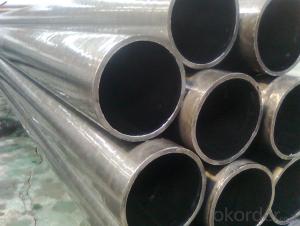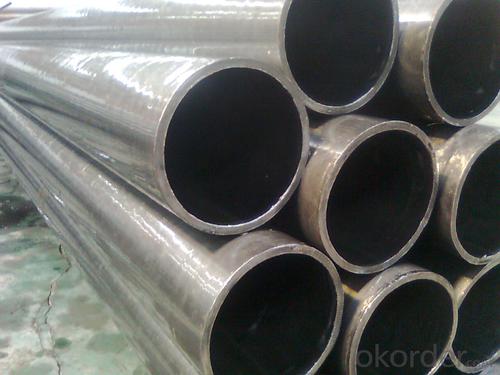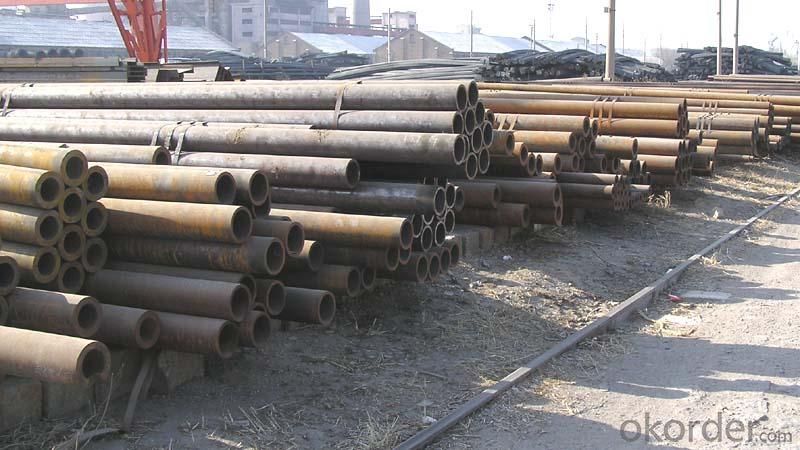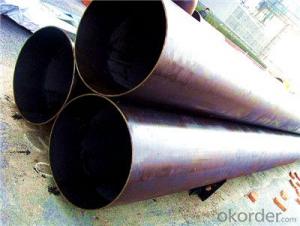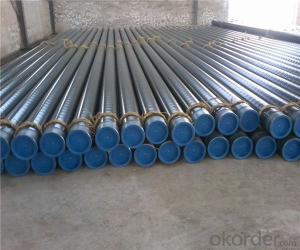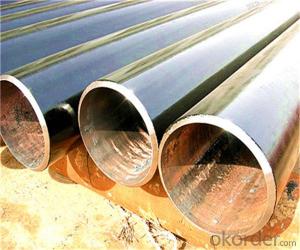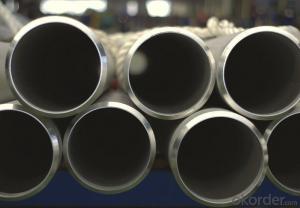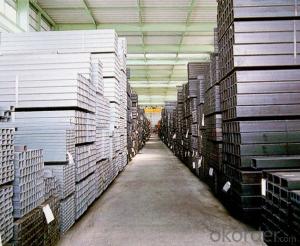Alloy Seamless Steel Pipe with high quality from factory
- Loading Port:
- Tianjin
- Payment Terms:
- TT OR LC
- Min Order Qty:
- 50 m.t.
- Supply Capability:
- 200000000 m.t./month
OKorder Service Pledge
OKorder Financial Service
You Might Also Like
PRODUCT DETAILS
1.Structure of Seamless Steel Pipe Description:
A large amount of Seamless Steel Pipes is offered to the clients at cost effective rates. These pipes are extremely durable, resistant to corrosion and have high tensile strength. Our pipes are used in nuclear plants, power plants, refineries and construction industry across the country. Furthermore, we are capable of providing these seamless pipes to the clients in bulk quantity.
2.Main Features of the Steel Pipe:
• High manufacturing accuracy
• High strength
• Small inertia resistance
• Strong heat dissipation ability
• Good visual effect
•Reasonable price
3.Packaging & Delivery:
| Packaging Details: | Seaworthy packages, bundles wrapped with strong steel strip |
| Delivery Detail: | 15-30 days after received 30% TT |
4.Seamless Steel Pipe Specification:
| Standard: | GB, DIN, ASTM,ASME, ASTM A106-2006, ASTM A53-2007 |
| Grade: | 10#,20#, 45#, 16Mn |
Thickness: | 8 - 33 mm |
| Section Shape: | Round |
| Outer Diameter: | 133 - 219 mm |
| Place of Origin: | Shandong, China (Mainland) |
| Secondary Or Not: | Non-secondary |
| Application: | Hydraulic Pipe |
| Technique: | Cold Drawn |
| Certification: | API |
| Surface Treatment: | factory state or painted black |
| Special Pipe: | API Pipe |
| Alloy Or Not: | Non-alloy |
| Length: | 5-12M |
| Outer Diameter: | 21.3-610mm |
5.Product pictures
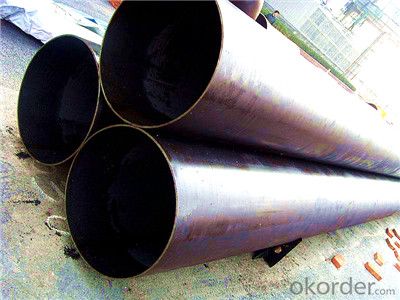
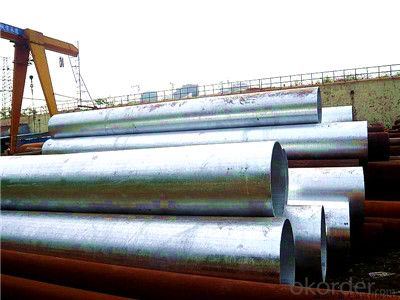
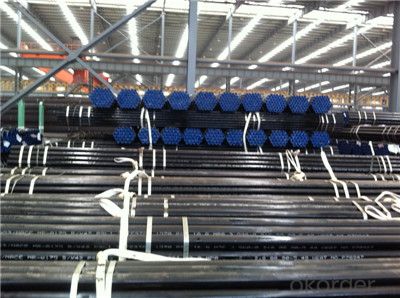
5.FAQ of Seamless steel pipe:
①How is the quality of your products?
Our products are manufactured strictly according to national and internaional standard, and we take a test
on every pipe before delivered out. If you want see our quality certifications and all kinds of testing report, please just ask us for it.
Guaranteed: If products’ quality don’t accord to discription as we give or the promise before you place order, we promise 100% refund.
②How about price?
Yes, we are factory and be able to give you lowest price below market one, and we have a policy that “ for saving time and absolutely honest business attitude, we quote as lowest as possible for any customer, and discount can be given according to quantity”,if you like bargain and factory price is not low enough as you think, just don’t waste your time.Please trust the quotation we would give you, it is professional one.
③Why should you chose us?
Chose happens because of quality, then price, We can give you both.Additionally, we can also offer professional products inquiry, products knowledge train(for agents), smooth goods delivery, exellent customer solution proposals.Our service formula: good quality+good price+good service=customer’s trust.
SGS test is available, customer inspection before shipping is welcome, third party inspection is no problem.
Any question, pls feel free to contact us !
- Q: Can steel pipes be used for stadium construction?
- Yes, steel pipes can be used for stadium construction. Steel pipes offer several advantages that make them suitable for this purpose. Firstly, steel pipes are strong and durable, making them capable of withstanding heavy loads and providing structural stability to large structures like stadiums. They have high tensile strength, which means they can resist bending or breaking under pressure. Additionally, steel pipes are resistant to corrosion, which is crucial for outdoor structures like stadiums that are exposed to various weather conditions. Their resistance to rust and other forms of degradation ensures the longevity of the stadium. Furthermore, steel pipes are versatile and can be easily fabricated into different shapes and sizes, allowing for customized designs and efficient installation. Moreover, steel pipes offer cost-effectiveness in stadium construction. They can be easily produced in large quantities, making them readily available and affordable. The ease of transportation and installation of steel pipes also contributes to their cost-effectiveness. Another advantage of using steel pipes for stadium construction is their sustainability. Steel is a recyclable material, and using steel pipes promotes environmental responsibility. The recyclability of steel reduces the demand for new materials and minimizes waste. In summary, steel pipes can indeed be used for stadium construction due to their strength, durability, resistance to corrosion, versatility, cost-effectiveness, and sustainability.
- Q: What's the difference between a cracked carbon steel tube and a liquid carbon steel tube?
- Cracking carbon steel pipe higher requirements, the general carbon steel pipe to be normalized, the fluid carbon steel pipe as long as the normal annealing treatment.
- Q: How to establish a concrete-filled steel tubular column model in ANSYS?
- First, you have to choose at least three or more types of materials. Modeling is a little complicated. Strongly recommended that the landlord to see "ANSYS in civil engineering applications", where there is such an example, you step by step, step by step back, and then in accordance with their own requirements modeling, OK. Wish you success
- Q: What is the difference between hot-dip galvanizing and electroplating for steel pipes?
- Hot-dip galvanizing and electroplating are both methods used to protect steel pipes from corrosion, but they differ in the process and the properties of the resulting coating. Hot-dip galvanizing involves immersing the steel pipe in a bath of molten zinc, which forms a thick and durable coating that bonds metallurgically with the steel. This provides excellent corrosion resistance and protection even in harsh environments. On the other hand, electroplating involves the deposition of a thin layer of zinc onto the steel pipe using an electric current. While electroplating also offers corrosion protection, the coating is typically thinner and less durable than hot-dip galvanizing. Hot-dip galvanizing is typically preferred for steel pipes that require long-lasting protection, while electroplating may be suitable for applications where a thinner coating is sufficient.
- Q: What is an electric welded pipe (EFW)? Seek help!
- It is through one or several consumable between the electrode and the workpiece on the metal heating the metal between a process with the arc to metal and filler material fully melted, no pressure, filler metal parts work from all electrodes
- Q: Which is cheaper, angle iron or steel pipe?
- The model does not mean the size of the different edges and sizes of the same model. Therefore, the width, the edge and the thickness of the angle iron should be filled out in the contract and other documents, so as not to be indicated by the model alone. Standard Specification for hot-rolled equal angle iron is 2#-20#. The angle iron can be made up of different force components according to the different structure, and can also be used as the connecting piece between the components. Widely used in a variety of architectural and engineering structures, such as beams, bridges, towers, hoisting and conveying machinery, ships, industrial furnace, reaction tower, container frame and warehouse.
- Q: Can galvanized pipe be welded with seamless steel tube? What should I do to connect?
- Processing method is very simple, I suggest you add blue disk connection, you can not use welding ~ ~ ~!The gas pipe is the best galvanized pipe, mainly play a role in anti-corrosion ~ ~ ~ ~ if you must use seamless connection can.When welding, can open a certain groove, use galvanized material electrode, but the premise is must be welded with seamless tube firmly.
- Q: How are steel pipes classified based on their diameter?
- Steel pipes are classified based on their diameter by categorizing them into different size ranges, such as small diameter pipes, medium diameter pipes, and large diameter pipes.
- Q: What are the different grades of steel used in pipe manufacturing?
- There are various grades of steel used in pipe manufacturing, including carbon steel, alloy steel, stainless steel, and duplex steel.
- Q: What is the impact resistance of steel pipes?
- The impact resistance of steel pipes is quite high due to the inherent properties of steel as a material. Steel is known for its strength and durability, which makes it able to withstand significant external forces and impacts without deforming or breaking. The impact resistance of steel pipes is further enhanced by their construction and design. Steel pipes are typically made using various manufacturing techniques such as seamless or welded construction, which ensures uniformity and strength throughout the pipe structure. This construction process eliminates weak points or seams that could compromise the impact resistance of the pipe. Moreover, steel pipes can be engineered to meet specific requirements for impact resistance based on the intended application. Different grades and types of steel can be used to achieve varying levels of impact resistance, allowing for customization to suit different industries and environments. The high impact resistance of steel pipes is particularly advantageous in industries such as construction, oil and gas, and transportation, where pipes are subjected to heavy loads, pressure, and potential impacts. Steel pipes can withstand these conditions, making them a reliable choice for various applications. In summary, the impact resistance of steel pipes is excellent due to the inherent strength and durability of steel as a material, as well as the construction techniques used in their manufacturing. Steel pipes can withstand significant external forces and impacts, making them a reliable and robust choice for a wide range of industries and applications.
Send your message to us
Alloy Seamless Steel Pipe with high quality from factory
- Loading Port:
- Tianjin
- Payment Terms:
- TT OR LC
- Min Order Qty:
- 50 m.t.
- Supply Capability:
- 200000000 m.t./month
OKorder Service Pledge
OKorder Financial Service
Similar products
Hot products
Hot Searches
Related keywords
